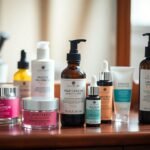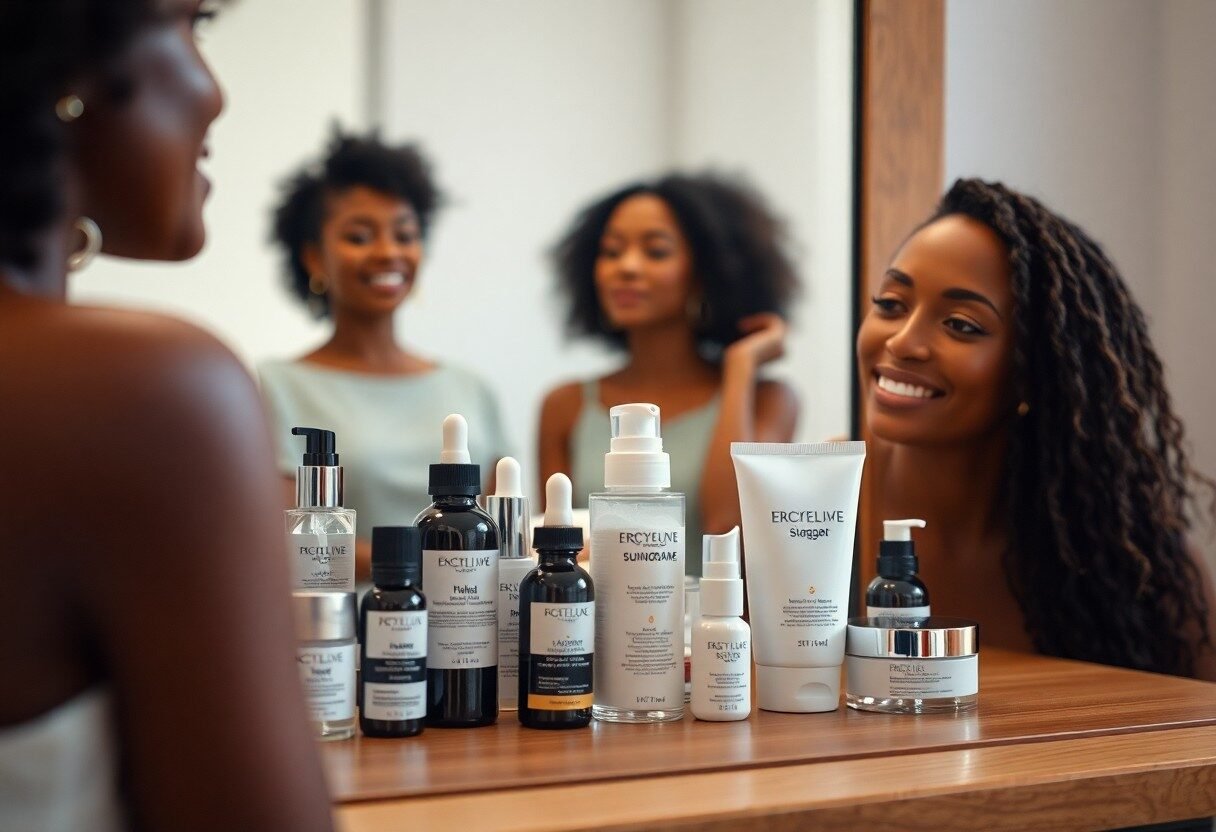
With a diverse range of skin tones and types among women of color, choosing the right skincare products can make all the difference in achieving a radiant complexion. In this post, I’ll share my top recommendations that cater specifically to your unique needs, addressing issues like hyperpigmentation, dryness, and sensitivity. By incorporating these vital products into your routine, you can enhance your natural beauty and achieve healthy, glowing skin. Let’s probe the must-haves that every woman of color should consider in her skincare arsenal.
Key Takeaways:
- Focus on hydration: Moisturizers with ingredients like hyaluronic acid and shea butter are crucial for maintaining skin moisture and elasticity.
- Consider your skin type: Choose products tailored for oily, dry, combination, or sensitive skin to ensure the best results.
- Sunscreen is a must: Use broad-spectrum SPF 30 or higher to protect against UV damage, which can affect hyperpigmentation.
- Embrace vitamin C: Incorporating vitamin C serums can help brighten skin and even out skin tone.
- Exfoliation is key: Regular use of gentle exfoliants, like chemical exfoliants (AHAs or BHAs), can improve texture and promote cell turnover.
- Look for niche brands: Many brands cater specifically to the needs of women of color, providing products that address unique skin concerns.
- Patch test new products: Always conduct a patch test to avoid adverse reactions, especially with products that contain active ingredients.
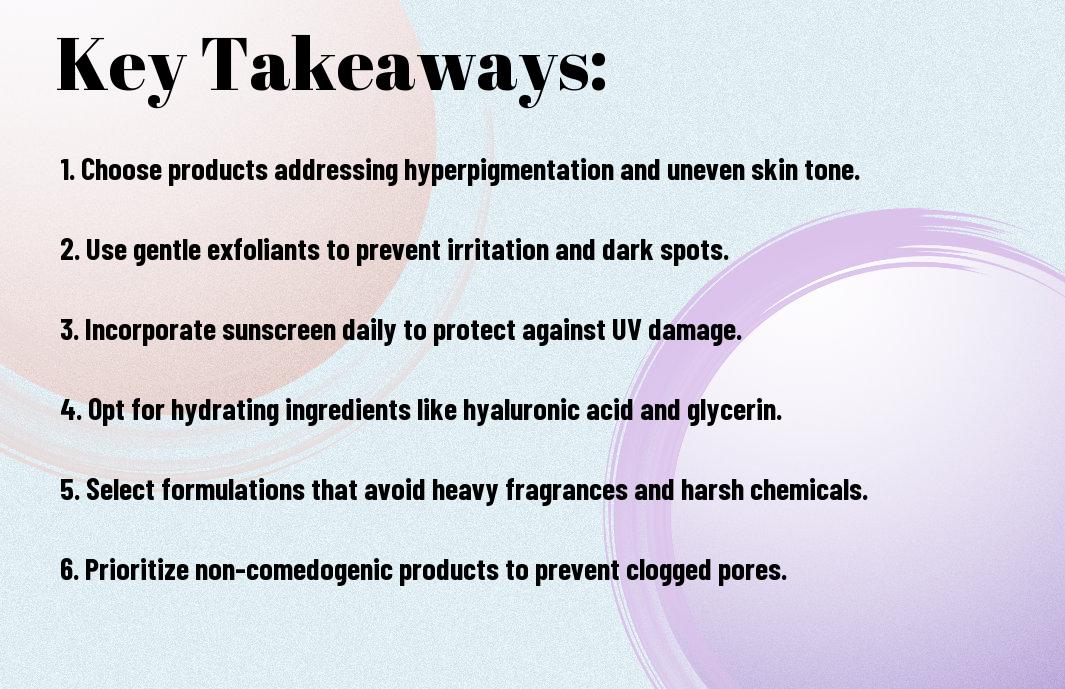
The Unique Skin Characteristics of Women of Color
Melanin and Its Protective Qualities
Melanin, the pigment that gives skin its color, provides natural protection against the sun’s harmful UV rays. With higher melanin content, many women of color have a lower risk of skin cancer compared to those with lighter skin. This increased melanin not only protects against sun damage but also contributes to a unique radiant glow. However, it’s necessary to remember that while melanin offers some protection, it does not eliminate the need for sunscreen in your daily skincare routine.
Common Skin Concerns and Conditions
Women of color often face specific skin concerns that differ from those of lighter skin tones. Issues such as hyperpigmentation, keloid formation, and acne scarring can be more prominent and challenging to treat. The varying levels of skin sensitivity and reactions to products also play a significant role in shaping your skincare regimen.
Hyperpigmentation, for instance, occurs when excess melanin leads to dark patches on the skin, commonly resulting from inflammation, hormonal changes, or sun exposure. Keloids, which are raised scars that develop after an injury, can be more frequent among women of color, particularly those with darker skin tones. Additionally, acne is prevalent, and the scars it leaves behind can take a long time to fade due to the rich melanin, making it vital to choose products that not only prevent breakouts but also address existing discoloration effectively.
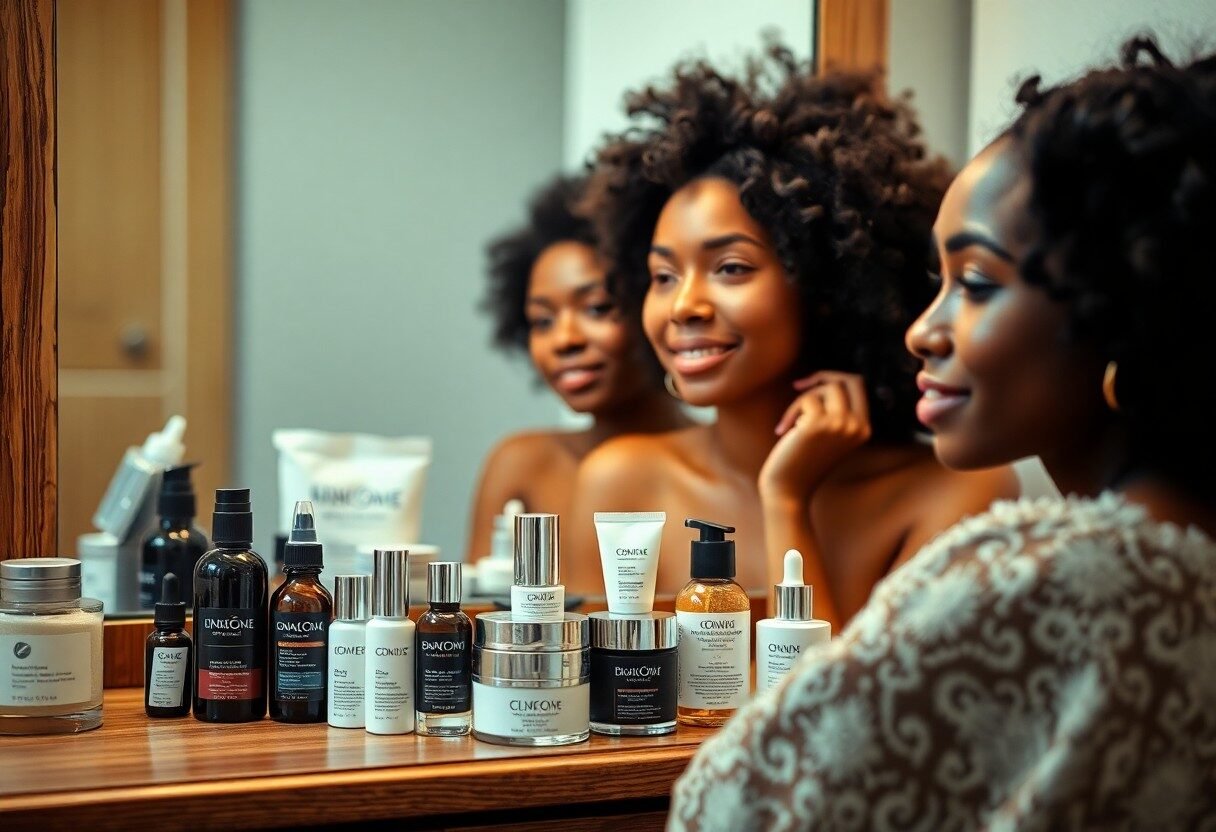
The Foundations of a Skincare Routine
Cleansing: Choosing the Right Formulation
Start your skincare journey with a cleanser tailored to your skin type. For women of color, formulations that hydrate while removing impurities work best. Look for gentle cleansers with ingredients like aloe vera or hyaluronic acid, which provide moisture without stripping natural oils. Creamy formulations can be especially beneficial, as they cater to the often-dryer skin types prevalent in melanin-rich skin.
Exfoliation: Breaking Down Barriers
The goal of exfoliation is to slough away dead skin cells and renew your complexion. For women of color, utilizing both physical exfoliants, such as scrubs with natural grains, and chemical exfoliants, such as AHAs or BHAs, is effective. Regular exfoliation reveals brighter skin while helping to prevent issues like hyperpigmentation.
Exfoliation should occur about 1-3 times a week, depending on your skin’s sensitivity. Start slow with gentler formulations, especially if you’re new to exfoliating. Keeping an exfoliation schedule helps in targeting specific concerns like dark spots and uneven texture, which can be common in darker skin tones. Always ensure you follow up with sunscreen; otherwise, you may risk further skin damage.
Moisturizing: Locking in Hydration
Choosing the right moisturizer can dramatically impact your skin’s appearance. Formulations rich in emollients, like shea butter or ceramides, work especially well for women of color as they nourish and maintain moisture levels. Look for products designed to combat dryness, which can exacerbate issues like flakiness and uneven skin tone.
Hydration is a must, particularly because darker skin types can often appear dull if not sufficiently moisturized. A good moisturizer not only retains the skin’s moisture balance but also provides a protective barrier against environmental stressors. Incorporating a nighttime cream with added benefits, like retinol, can elevate your routine, ensuring your skin stays healthy and radiant while you sleep.
Targeted Treatments Tailored for Diverse Skin Tones
Serums and Oils: Nutritional Necessities
Serums and oils are indispensable for your skincare regimen, especially when addressing specific concerns like dryness or uneven tone. Look for products rich in ingredients like vitamin C or argan oil. These components work wonders by providing important nutrients that help to nourish your skin. With their concentrated formulas, serums penetrate deeper layers, delivering hydration and radiance to your complexion. Choosing the right serum can mean the difference between dull skin and a healthy glow.
Treatments for Hyperpigmentation: Effective Solutions
Hyperpigmentation can be a common issue for women of color, but there are effective solutions available. Products that feature ingredients like hydroquinone, niacinamide, or kojic acid can significantly lighten dark spots over time. Regular use of these treatments can help even out your skin tone, restoring its natural vibrancy and clarity.
For hyperpigmentation, I recommend incorporating a targeted treatment that promotes cell turnover and skin renewal. Retinoids, for instance, not only help fade dark spots but also minimize fine lines and improve overall skin texture. Combining these with a daily broad-spectrum SPF is important to prevent further discoloration. In clinical studies, results show a notable improvement in skin tone with consistent use, with many users reporting a more uniform complexion within 12 weeks. Achieving brighter, even-toned skin is truly possible with the right approach.
The Importance of Sun Protection in Skincare
Debunking Myths About Sunscreen
Many believe that darker skin doesn’t require sunscreen, but this is a dangerous misconception. While melanin does provide some natural protection, it does not shield against harmful UV rays. Statistically, studies show that skin cancers, such as melanoma, are less common in darker skin but tend to be diagnosed at a later stage, leading to poorer outcomes. Every skin type—regardless of melanin content—benefits from regular sun protection.
Finding the Right SPF for Darker Skin
Navigating the world of SPF can be confusing, especially for women of color. A broad-spectrum sunscreen with an SPF of 30 or higher is generally recommended, as it blocks approximately 97% of UVB rays. However, I’ve found that many sunscreens leave a white cast, which can be particularly frustrating. Look for products formulated specifically for darker skin tones, which often use mineral-based formulas or tinted options to blend seamlessly.
Some brands cater specifically to women of color by offering sunscreens that absorb quickly and do not leave a visible residue. Ingredients like zinc oxide and titanium dioxide are common in physical sunscreens, but I’ve found that newer formulations include added skin-beneficial components such as hyaluronic acid and antioxidants. This not only enhances absorption but can also offer additional hydration and repair benefits. Always test a few options to see what feels best on your skin, as consistency is key; reapply every two hours, especially if you’re sweating or swimming.
Navigating Ingredient Lists: What to Embrace and What to Avoid
Beneficial Ingredients: Natural Boosters
In the quest for radiant skin, I often turn to ingredients that offer natural nourishment. Brightening agents like vitamin C and licorice extract help even skin tone, while hydrators such as hyaluronic acid and glycerin lock in moisture, making my skin feel plump and youthful. Additionally, nourishing oils like jojoba and argan provide important fatty acids that support the skin barrier and add that coveted glow. Embracing these ingredients can transform your skincare routine and amplify the natural beauty of your complexion.
Harsh Chemicals: Red Flags to Watch Out For
Certain ingredients can wreak havoc on dark skin, so being vigilant about what I put on my face is important. Look out for sulfates, parabens, and synthetic fragrances, as these can disrupt the skin’s natural balance and lead to irritation or breakouts. Additionally, avoid products containing alcohol and artificial dyes, which can dry out or cause redness on melanin-rich skin.
Specifically, parabens and sulfates are preservatives often found in many cosmetics that can trigger allergic reactions and sensitivity over time. They can strip away natural oils, leading to dryness and exacerbating issues like hyperpigmentation. Learners from dermatologists often share firsthand accounts of clients suffering from sensitive skin due to harsh chemicals. Choosing products labeled as “free from” these ingredients can lead to a gentler approach to beauty, ensuring your skincare regimen remains kind to your skin while effectively addressing its unique needs.
Makeup and Its Role in Skincare
Selecting Products That Complement Skincare
Finding makeup that works harmoniously with your skincare routine can significantly enhance your overall look and health. Opt for products that are non-comedogenic and hydrating to prevent clogging pores and maintain moisture balance. I prefer foundations with a dewy finish that contain beneficial ingredients like vitamins and antioxidants. Always test products on your skin to ensure they align well with your specific skin type and complexion, especially given that undertones in darker skin can vary dramatically.
Common Makeup Mistakes for Women of Color
Many women of color face unique challenges in makeup application, often resulting in a less-than-flattering look. One prevalent mistake is choosing the wrong foundation shade, leading to an ashy or overly orange appearance. Additionally, neglecting to blend products well, particularly around the jawline and hairline, can create stark contrast and detract from the natural beauty of your skin.
Many common makeup pitfalls stem from the lack of tailored products for diverse skin tones. For instance, foundations labeled as “universal” often fall short, leaving many women searching for suitable shades that match their unique undertones. Using powders or blushes that are too light or too dark can further accentuate unevenness rather than enhance your features. Learning about your skin’s undertone—whether warm, cool, or neutral—can help avoid these issues, ensuring your makeup enhances your natural glow instead of masking it.
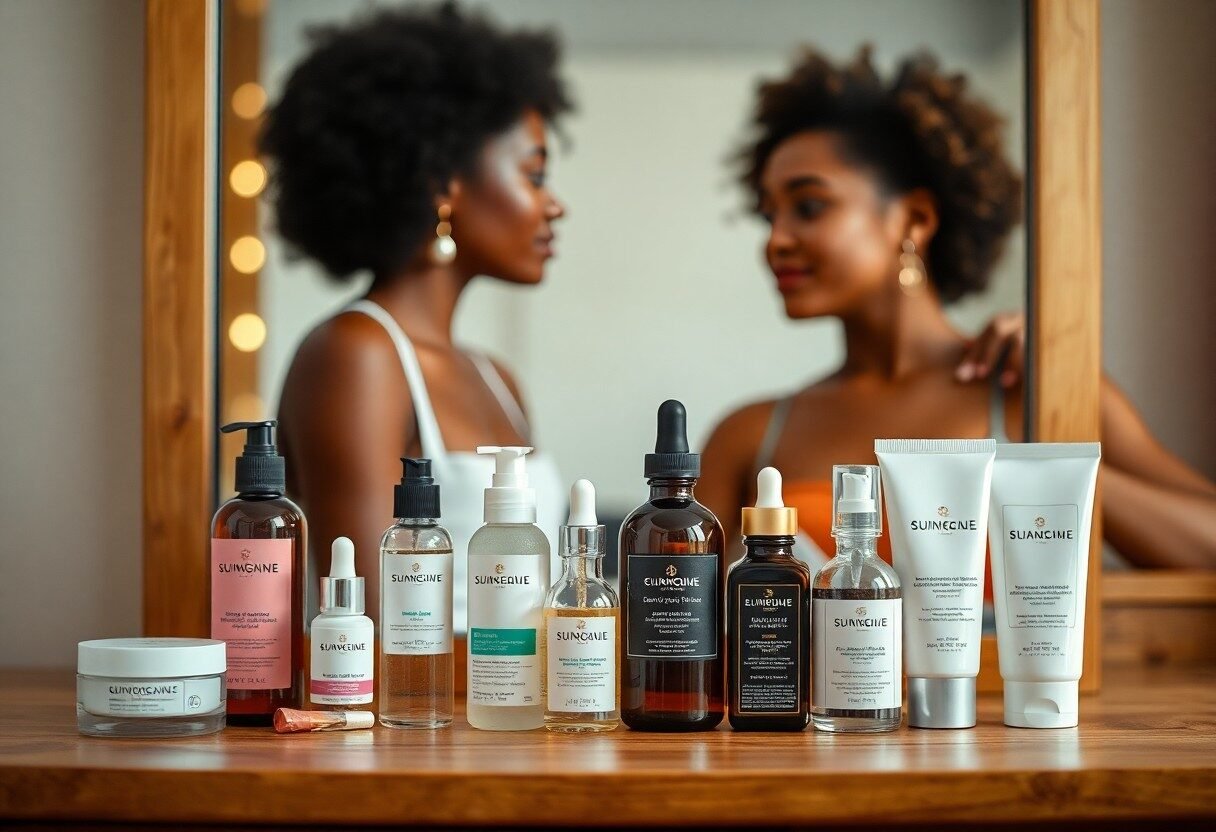
Cultural Influences on Skincare Practices
Traditional Remedies and Their Modern Applications
Many women of color draw from traditional remedies that have been passed down through generations. Ingredients like turmeric, aloe vera, and shea butter not only soothe the skin but also provide various benefits such as anti-inflammatory and moisturizing properties. Emerging brands are now incorporating these ancient ingredients into modern formulations, effectively bridging the gap between traditional wisdom and contemporary skincare science.
Celebrating Diversity in Beauty Routines
The beauty routines of women of color are as diverse as their backgrounds, showcasing rich cultural narratives. From the use of oils in Afro-Caribbean traditions to the layering techniques found in East Asian skincare, these varied practices highlight the uniqueness of individual experiences. This diversity contributes to skincare innovation, prompting brands to explore formulations that meet the needs of different skin types and concerns.
Understanding these beauty rituals offers valuable insights into how cultural heritage shapes our approach to skincare. For instance, the multi-step routines that are prevalent in Asian cultures emphasize the importance of hydration and prevention, while African traditions often celebrate natural oil use to maintain skin barrier integrity. By integrating these cultural elements into our daily skincare, you not only celebrate diversity but also elevate your skincare game with tried-and-true methods. Through embracing this diversity, we can collectively advocate for products that respect and meet our individual requirements.
Embracing Skin Confidence: The Emotional Aspects of Skincare
Building Self-Esteem Through Skincare Choices
Making informed skincare choices can significantly boost your self-esteem. When I invest in products tailored to my unique skin needs, I often feel a sense of pride and empowerment. Selecting nourishing ingredients that enhance my complexion not only improves my skin’s health but also reinforces a positive self-image. This journey reflects my commitment to self-care and validates my beauty.
The Role of Community and Shared Experiences
Communities focused on skincare can create safe spaces for women of color to share their experiences and recommendations. I’ve found that discussing products, routines, and challenges with others who understand my skin type fosters a sense of belonging. These conversations often lead to discovering new products or techniques that can enhance my routine.
Engaging in community discussions increases awareness of the diverse needs among women of color. Through platforms like social media, forums, and local events, we can exchange personal stories that highlight our unique skincare journeys. This shared experience not only builds solidarity but often sparks collaborations that lead to product development aimed specifically at our needs, helping the skincare industry recognize and address the gaps that exist. Ultimately, these interactions cultivate a network of support that celebrates our beauty while encouraging us to advocate for ourselves and each other.
Final Words
To wrap up, understanding your unique skincare needs as a woman of color is vital for achieving healthy skin. I encourage you to explore vital products tailored for your skin type and tone, such as moisturizers rich in hydration, sunscreens that cater to darker skin, and targeted treatments for specific concerns. By investing time in selecting the right products, you empower yourself to shine confidently. Your skin deserves the best, and with a personalized routine, you can achieve the glowing complexion you desire.
FAQ
Q: What are the vital skincare products for women of color?
A: The vital skincare products for women of color include a gentle cleanser, a hydrating toner, a vitamin C serum, a moisturizer with SPF, a nourishing night cream, an eye cream, and a lip balm. These products help address specific skin concerns such as hyperpigmentation and dryness.
Q: Why is sunscreen important for women of color?
A: Sunscreen is vital for women of color as it protects the skin from harmful UV rays, which can lead to skin damage and exacerbate hyperpigmentation. Many assume that darker skin tones do not need sunscreen, but all skin types are susceptible to sun damage and should use a broad-spectrum SPF daily.
Q: How can I choose the right moisturizer for my skin type?
A: To choose the right moisturizer, first identify your skin type—oily, dry, combination, or sensitive. Look for products containing ingredients that cater to your needs. For oily skin, lightweight, non-comedogenic options are ideal, while richer creams are better for dry skin. Always check for ingredients like hyaluronic acid for hydration and niacinamide for oil control.
Q: What ingredients should I look for in serums designed for my skin tone?
A: When choosing serums, look for those with vitamin C for brightening, hyaluronic acid for hydration, and niacinamide to reduce the appearance of dark spots. These ingredients cater specifically to common concerns among women of color, such as uneven skin tone and dryness.
Q: Are there specific products recommended to reduce hyperpigmentation?
A: Yes, products containing ingredients like hydroquinone, azelaic acid, and retinoids are effective at addressing hyperpigmentation. Additionally, look for formulations that include glycolic acid or lactic acid, as they help exfoliate and promote cell turnover, aiding in the fading of dark spots.
Q: How often should I exfoliate my skin?
A: Exfoliation is important but should be done with care. Generally, it is recommended to exfoliate 1-2 times a week, depending on your skin type. Sensitive skin may require less frequent exfoliation. Choose a gentle physical scrub or a chemical exfoliant with AHAs or BHAs for best results.
Q: What are some common skincare myths for women of color?
A: One common myth is that women of color do not need sunscreen due to higher melanin levels. This is not true, as everyone is at risk for sun damage. Additionally, some believe that all skincare products designed for lighter skin will not work for darker tones. In reality, many products are formulated to address hyperpigmentation and specific needs of melanin-rich skin.



